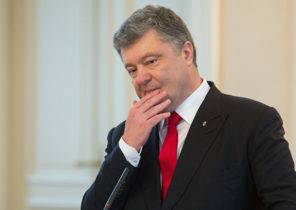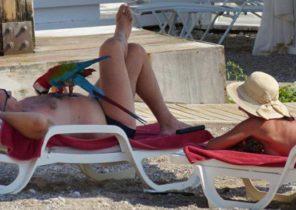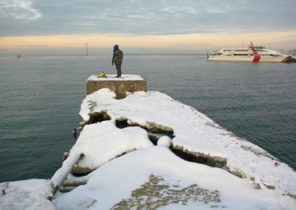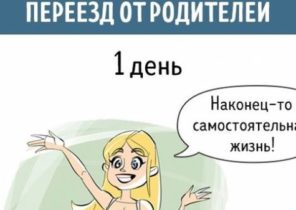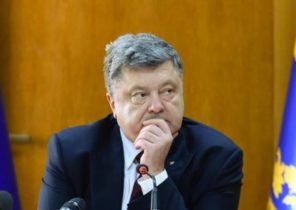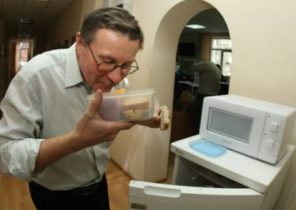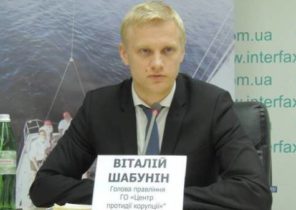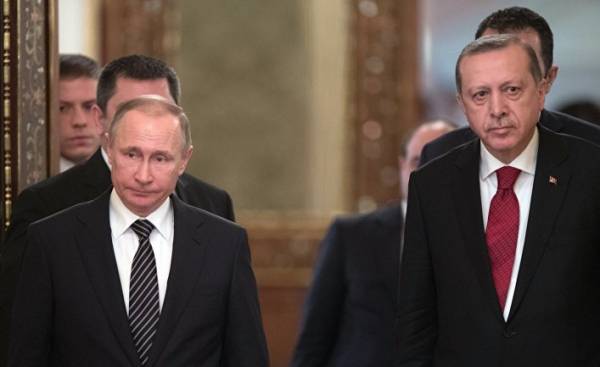
Between the leaders of Russia and Turkey clearly remain suspect because of their long-term goals are very different. Anyway, at the moment, they consider that cooperation is needed, particularly against Americans.
Although women in Turkey gained the right to vote in 1934 (in 1945 in France) and Tansu Ciller served as Prime Minister from 1993 to 1996, the development direction of Turkish policy, particularly in terms of relations with Russia, remains “the men”. Including it is connected with strong personal qualities of the leaders of the two countries (Erdogan has been in power since 2003, and Putin — since 1999).
A bit of history
In historical terms the relations of Russia (where there are mostly Slavs) and Turkey (Turkic-speaking peoples including China) has always been restless. Repeated clashes took place in the Eurasian steppes and in the black sea basin. The capture of Constantinople by the Ottomans in 1453 marked the end of the Byzantine Empire and Russia took the place of the center of the Eastern Orthodox Church. Now Moscow calls himself her protector, which creates certain difficulties in the relations with the current government in Ankara, which started the Islamization of society and adheres to the logic of the clash of civilizations.
After the Russo-Turkish war of 1768-1774 to the Treaty of küçük Kaynarca allowed Russia to access to the Mediterranean sea through the Black. It was necessary to break through the encirclement: this complex is tightly entrenched in the Russian soul and still exists today.
In the course of the nineteenth century Russia tirelessly helped the Slavic and Christian minorities to revolt against the Ottoman Empire. In the Crimean war of 1853-1856, the Russian Empire came together with the coalition of the Ottoman Empire, France and the UK. The main battle unfolded in the Crimea and particularly around the naval base in Sevastopol. The conflict ended with the defeat of Russia and the signing of the Treaty of Paris of 1856 on the demilitarization of the Black sea. However, the defeat of France in the war of 1870 led to the abolition of provisions on demilitarization, and Russia began to restore the fleet.
The last time both empires were openly opposed each other during the First world war, after which they both disappeared. On this era it is impossible to recall without mentioning the incident about the same time a terrible genocide. It is worth noting that Russia encouraged Armenian population to revolt against the Ottoman authorities in order to promote their military offensive in the West.
In the 1920’s, the Bolsheviks supported the war for independence, and the founder of modern Turkey Mustafa Kemal Ataturk has received substantial financial and military aid from Lenin. That is why two of his faithful companion (one of the founders of the red army, Mikhail Frunze, and his successor, Marshal Kliment Voroshilov) was on the monument of Republic in Taksim square in Istanbul. During this period, the Soviet Union refused territorial claims to the West of Armenia and the Bosphorus. March 16, 1921 the Soviet Union recognized the young Turkish Republic was signed in Moscow the agreement. In October, a similar agreement was signed in Kars, Armenia, Azerbaijan and Georgia. In 1925 was signed the Soviet-Turkish non-aggression Pact. Incidentally, expelled from the Soviet Union Leon Trotsky from 1929 to 1933 he lived on the island of Buyukada in the Marmara sea, from where it moved to France, Norway and Mexico, where was assassinated in 1940 by Stalin’s agent.
Tensions again began to increase with the signing of the Montreux Convention of 1936, when Turkey has made militarization of the Bosphorus. The USSR left the non-aggression Pact and the newly raised territorial claims on Eastern Turkey. During the Second world Moscow obviously was not like “neutrality” of Turkey (until March 19, 1945: this episode today, apparently, completely alien to President Erdogan), which passed the Nazi ships through the Bosphorus. The outcome of the July 1945 Potsdam conference, Stalin was denied a request to participate in the defense of the Straits. Turkey decisively sided with the Western camp and participated in the Korean war from 1950 to 1953. The Soviet Union provided active assistance to North Koreans (primarily aviation), which, in fact, made him enemies of Turkey. In 1952 Turkey joined NATO and security of the southern flank of Europe in the confrontation with the police.
Further, the history of modern Turkey were marked by military coups (1960 — 1971 — 1980 — 1997 — 2016) and held in July-August 1974, invasion of Cyprus, where was formed the Turkish Republic of Northern Cyprus.
The Islamists gradually crept to the government, while the Party of justice and development (has connections with the “Muslim brotherhood”) did not stand at the head of the country in 2002 (in 1996 the victory is already getting Pro-Islamic welfare Party of Necmettin Erbakan, but the military ousted the government in 1997).
The Kurdish question
The main problem of modern Turkey — Kurdish separatists of the PKK. This is the Marxist-Leninist movement was founded in 1978 (with the help of Moscow, which saw it as a meaningful way to destabilize a NATO country), moved to violent action in 1984 and since then leads a guerrilla war in the South-East. With the collapse of the Warsaw Pact in 1991 Russia, of course, no longer has any relation to it. Its rear bases are in Northern Iraq near the Iranian border, and in 1980-1990-ies were also in Lebanon and Syria. The movement’s leader, Abdullah öcalan even enjoyed “diplomatic” protection in the country. As a consequence, relations between Ankara and Damascus were worse than ever, and the Soviet supporters of Syria felt a strong distrust of Turkey.
The collapse of the Soviet Union on 21 December 1991 (he followed the dissolution of the Warsaw Pact in July) was the impetus to improve relations between Moscow and Ankara, which was confirmed on 25 may 1992 with the signing of a new agreement. Russia is no longer offered Syrian allies protection. In return, Ankara has had on the Damascus strongest pressure up to the threats of military intervention to ensure “security” at the border. In 1998, Damascus took the decision to expel Ocalan. Worthy of the best spy novels, the chase led Slovenia to Greece, Russia, Italy and finally to Kenya where he was detained by Turkish intelligence services (probably not without the help of the CIA and Mossad). He was sentenced to death, which is then commuted to life imprisonment (he’s serving it on the island of Imrali in the Marmara sea).
Erdogan and the politics of the weather vane
The death of Hafez al-Assad on 10 June 2000 and the coming to power of his son Bashar changed the balance. With the victory of the AKP in 2002 and the appointment of Prime Minister Erdogan in 2003, Turkey has restored relations with Syria. Erdogan even had enough warm personal relationship with Assad. In 2004 was signed an agreement on free trade and friendship between the two countries. In 2009 it was followed by an agreement on “strategic partnership”.
However, in 2011, Erdogan, like many other political leaders from around the world were convinced that in a few weeks, Bashar al-Assad will carry the wave of “Arab spring”.
Then he decided to change course, to abandon Assad and to directly support the rebels and not worrying too much about their true motives.
He felt that his hour had come. He already saw himself as President (and indeed they became in 2014) and was hoping to turn Turkey into a presidential system (and “Turkish”, that is, despotic manner), what is happening now in our eyes: a referendum on the issue will take place on 16 April 2017. In 2011, he claimed to be the leader of the Sunni world, to be able to equal to talk with Iran, a longtime rival Turkey. It is worth Recalling that his doctrine is very close to the strategy of “Muslim Brothers” (a terrorist organization banned in Russia — approx.ed.): the seizure of power in the calculated result of the democratic game. So he came to the defense of best, in his opinion, the Palestinian cause to gain a foothold in the role of leader, especially after what happened at the end of the 2010 tragedy when attempted to break the Israeli blockade of Gaza, the ship was stormed by the guards (killing nine people). The once beautiful relationship between Turkey and Israel (although it is worth noting that since the AKP’s rise to power, their intensity has fallen) since then has deteriorated.
The apparent successes and resounding failures
He actually scored a number of successes.
The Turkish economy has grown significantly since the moment he took the helm. He was able to redistribute part of the financial manna for the benefit of the poor of the suburbs of Turkish cities and villages. It is this national environment gave him the voters who secured him victory in all elections where it participated. He directed citizens to the Soviet style, only to replace the political Commissars came true his case imams. In any case, the result is obvious: he has always secured a majority of votes without having to get into the urn.
With his first steps in politics in the 1970s, he enjoyed the covert support of the Hizmet movement of Fethullah Gulen. Under the guise of outwardly modern appearance, this religious organization infiltrated Turkish state institutions and particularly the police, courts and education. Greatly his presence, and the business community. His only real enemy was the military, which he was able to break through processes of conspiracy, thereby freeing the hands of Erdogan.
During the capture of Mosul by militants of the Islamic state (a terrorist organization banned in Russia — approx.ed.) employees of the Turkish Consulate with the families (48 people) were taken hostage. Although the jihadist movement usually deals with prisoners of war, Turkish intelligence agencies failed to achieve their release after more than a week of negotiations. Terms of the exchange are unknown, but it has become an undisputed success for Ankara.
In addition, Erdogan managed to do the unprecedented to all its predecessors: to start negotiations with the PKK. Although Ocalan is in prison, he remained a great influence on the part of Kurdish separatists. Support the struggle of Kurdish peoples Democratic party has acted as a political mediator. Erdogan has been able to achieve for the most part respected the truce. Activists of the PKK began to retreat to Iraqi Kurdistan.
But in the fine tuned mechanism flew into a grain of sand.
First of all, the regime of Bashar Assad had the nerve to show unexpected resistance. But the opposition movement has shifted to the more radical and difficult-controlled Islam.
The Gulen movement was behind the corruption allegations, Erdogan’s entourage (including one of his sons), although he always repelled by the image of his own honesty, which was in sharp contrast with the General atmosphere in Turkish politics.
DNP became a springboard that would allow him to gain a two-thirds majority in the Parliament in the elections of 2015, although such majority necessary for the adoption of a new Constitution with a cut under his presidential regime.
The Syrian Democratic Union (maintains close ties with the PKK) was able to achieve autonomy in three cantons along the Turkish border. Worse still, he was able to attract Western sympathy, the fight against ISIS, in particular during the battle for kobani.
Finally, some soldiers attempted to hold a coup on 15 July 2016. Although the organizers waited for inglorious failure, Erdogan used it as a pretext to crush resistance to his absolute power. He was sent to prison military, police, judges and intellectuals, describing them as a coup and the supporters of Gulen, although this movement did not stand for the coup.
The war with the PKK continues, and in the relations with Moscow narrowly avoided a major crisis.
In the summer of 2015 President Erdogan finally joined the coalition against ISIS and its aircraft (especially the us) to use the base in Incirlik. In response, Turkey was rocked by a series of terrorist attacks, responsibility for which was not officially taken, but was attributed to ISIS. Aggressive actions were on account of “falcons of freedom of Kurdistan” (associated with the PKK, an armed group). Surprisingly, Erdogan began an all-out war with the PKK, directly so do not hand in ISIS (a terrorist organization banned in Russia — approx.ed.). So, according to the UN, 2015 through the end of 2016, the Turkish forces have committed “gross violations” of human rights: deportation from 355 thousand to 500 thousand people, mass destruction and murder. The total loss amounted to about 2 million people (including 800 members of the security forces). More than 30 cities in the South-East of the country was partially destroyed.
To the surprise of the whole world and especially Ankara, at the end of September 2015 Russia to start direct intervention on the Syrian front in support of its ally Bashar al-Assad, who was in a critical situation, despite the help of Iran and the international brigades of the Lebanese Hezbollah, and Iraqi and Afghan Shiites. They all made their priority goal in varying degrees, Turkey-backed “moderate” opposition movement that brought Erdogan into a rage. And he decided to answer. 24, 2015 two years entrenched in an ambush near the border Turkish F-16 shot down a Russian fighter-bomber su-24, which only a few tens of seconds, flew into Turkish airspace. It is worth noting that since the beginning of the Russian intervention in Syria planes videoconferencing than once flew from Turkish territory. Both pilots managed to eject but one of them was killed Turkmen fighters. The second picked up the Russian-Iranian forces, however, during the operation killed one Russian soldier. The whole world held its breath: how to react to this Russian bear? Russia took a tougher economic sanctions, which have become a severe blow to the tourism sector, and limited hiring Turkish employees, especially in the construction industry. In addition, Turkey is almost entirely dependent on Russian gas, but there is no response, it was not.
Besides, in may 2016 the PKK took down a Turkish helicopter EN-1 Cobra in the area of Cukurca (Southeast Turkey) by using 9К38 MANPADS “Igla”. Both crew members were killed. Curiously, until the PKK did not receive such weapons. All this suggests that Russia has kindly passed it on to the PKK through the Syrian DS for attack on Turkish aircraft… a kind of “return the favor”.
Anyway, in June of 2016 President Erdogan has officially apologized for the deaths of two Russian military (but refused to pay compensation to the families). After some time in Turkey as if by accident, was arrested Turkmens who were suspected of killing the Russian pilot. It was Alparslan çelik of the “Grey wolves”, which are traditional Turkish ultra-right.
Erdogan, who began to teach all to sharp turns, went for the resumption of dialogue, not only with Russia but also with Israel: Benjamin Netanyahu he apologized for the victims during the storming of the ship, compensation to the families and allowed Turkey to participate in various humanitarian projects in the Gaza strip.
President Putin, in turn, one of the first to condemn the attempted coup of July 25, 2016. Speaking of which, shot down a su-24 pilots of the F-16 was subsequently accused of involvement in the coup!
Economic cooperation between the two countries again went up the hill, as in particular evidenced by the projects of construction of nuclear power plants and the gas pipeline “Turkish stream” (was approved by President Putin on 7 February 2017).
At the same time, they remain divided on international issues, including situation in Cyprus and in Nagorno-Karabakh. Despite the divergence of interests in Syria, both President simply demonstrate a striking pragmatism. They decided to divide the battlefield. Russia received carte Blanche in Aleppo, and Turkey supported the part of the rebels left the city to participate in the operation “shield of the Euphrates” on the Syrian-Turkish border between Jerablus on the West and Azaz in the West.
A Tangle Of Al-Bab, Manbij
The course started on 24 August 2016 operations of the Turks were taken are symbolic of the city as Dabic and al-Bab. Whatever it was, from the beginning, she began to link, and all of the camp were to admit “error” when firing.
The Americans, too, play an active role in this area. They support the “Syrian democratic forces”, the main component of which are the Kurds. In the summer of 2016 is the movement seized the city of Manbij in 48 kilometers North-West from El-Baba, and Erdogan announced the intention to bring it under control. SDS called for the Syrian army to be between al-Bab and Managem to divide the parties. In other words, the situation is explosive, and any incident can result in serious consequences.
Difficult situation for Turkey
The difficult situation of Turkey was recently podcherknuto another tragic event. 19 December 2016, the Russian Ambassador Andrei Karlov was killed by Turkish police. This man (at that time he was not in the performance) made the following statement in broken Arabic: “We are the ones who have sworn allegiance to Muhammad for Jihad until our last hour.” “Don’t forget about Aleppo, do not forget about Syria! (…) Allah is great!” he added in Turkish. It’s murder (no organization has claimed responsibility for it) was clearly the work of a loner who was unhappy with the Russian intervention in Syria and the policy of President Erdogan. All this emphasizes the almost never mentioned in the media fact: many Turks (even Kurdish origin) support the jihadist insurgency. Held in January 2016, the survey showed that only 10% of Turks think ISIS a terrorist movement! In addition, thousands of Turks are fighting in the ranks of ISIS and one way or another connected with “al-Qaeda” (the terrorist organization banned in Russia — approx.ed.)movements.
After Erdogan called ISIS the enemy, many are receptive to the theses of the movement of the Turks became “lost activists”, who is capable of anything. Besides, in the country there are more terrorist attacks, responsibility for which officially takes on ISIS (this is not to mention the actions of the PKK). Anyway, they have different goals: the separatist Kurdish movement aimed at representatives of the authorities (though not considered with the accompanying victims of terror), whereas IG has everything indiscriminately. For him, everything that is not subject to the “Caliph” al-Baghdadi, is a potential target. The task of IG is to kill a maximum of their own kind.
Of course, between the Russian and Turkish leaders remain suspect because of their long-term goals differ. But at the moment the cooperation is considered necessary, in particular to confront the Americans. After the election Donald trump President Putin has redoubled diplomatic efforts for peace talks with the participation of all parties to the Syrian conflict, meeting with the Israeli Prime Minister and President of Turkey (he probably believes that those “disappointed” by Washington), etc.
As for Erdogan, he has three main enemies, which he puts on the same level, and calls “terrorists”: PKK, ISIS and the Gulen movement, whose leader is still on the run in the United States. His dream of leadership in the Muslim world until they were pushed to the side, but he still intends to play a key role in the middle East. Domestically, it relies on the PSR, as well as neo-fascist and anti-Kurdish movement the Grey wolves.
Moscow is firmly fixed in Syria and is likely to launch new initiatives in Egypt, Libya, Morocco or anywhere else. The border puts the only financial weakness of Russia, which is unlikely to find funds for the implementation of all its plans.
Have presidents and another common point: they rely on security services that are considered important foreign policy tool.
